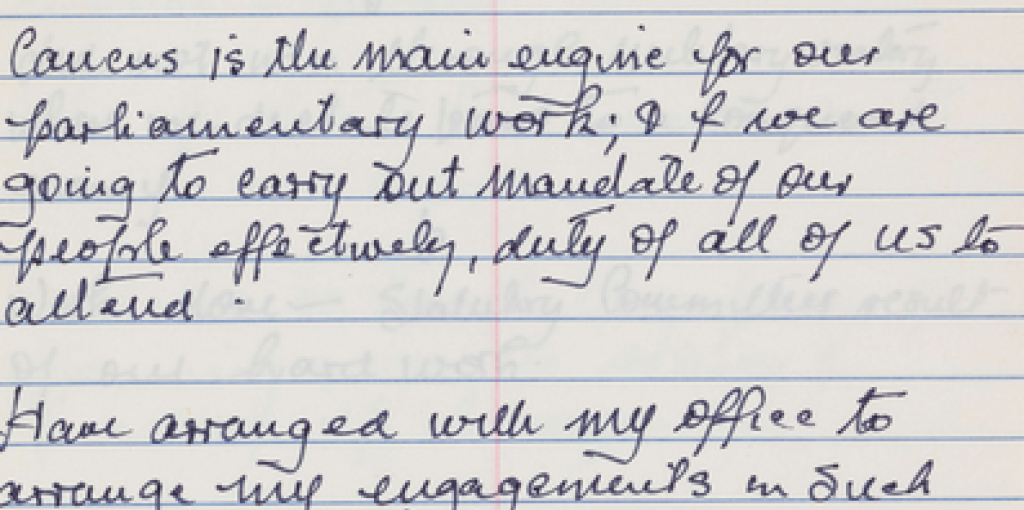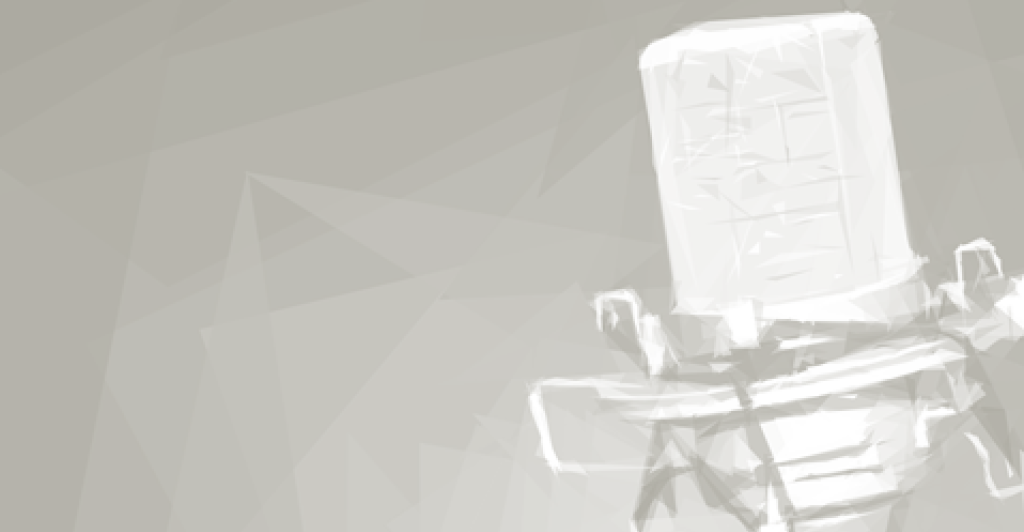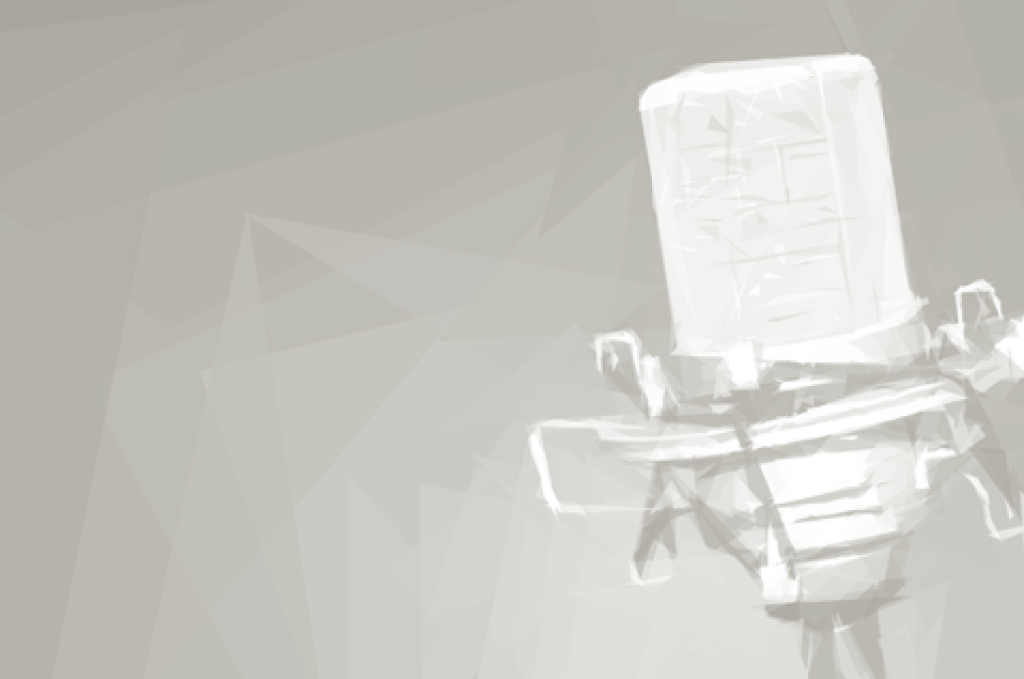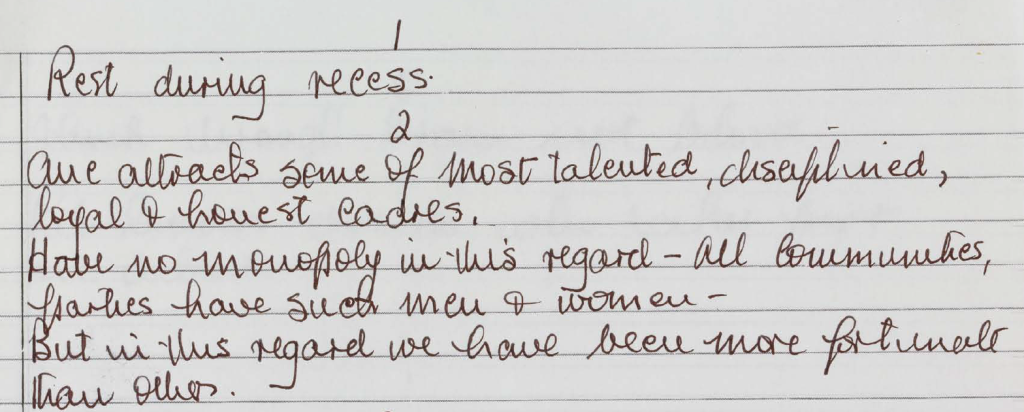‘Caucus’, Mandela told the ANC MPs, ‘is the main engine for our parliamentary work’.300 He was reminding them of their responsibilities, as he had done at the very first caucus meeting, when he told them, ‘You are now the government’.301 From that premise followed certain obligations which he would emphasise in caucus meetings he attended from time to time.

Despite not being a Member of Parliament, Mandela was always invited to ANC caucus meetings. He attended quite frequently, especially in the early days. But he would also make his influence felt indirectly through the presiding officers, caucus chairperson, chief whip and others who were very senior members of the movement. These included, in the first batch after the 1994 elections, Frene Ginwala as speaker, Govan Mbeki as Senate president, Makhenkesi Stofile as chief whip and Mendi Msimang as caucus chair.
In the first years, when many of his close colleagues and former prison mates in the ANC leadership were Members of Parliament, he would caucus issues with them and they would guide caucus meeting discussion. When it seemed necessary he would himself remind members of the ANC’s policy positions.302

He would also call them aside, to discuss with the senior people, caucus them
Whenever he did go to caucus meetings he was received with enthusiasm. Sometimes he would just sit and listen, and perhaps make contributions and give guidance.303 When he did address the caucus more formally, it was generally at the level of broad direction and approach rather than detailed issues, reminders of the roles and responsibilities of ANC members of parliament in the transition and transformation of the country.304
But there were also times when he brought his influence to bear on specific issues, either by lobbying close colleagues or by direct intervention in caucus.

frequent but irregular visits to the caucus. It was a source of huge excitement

Madiba had to smooth the way to setting the atmosphere where you respect the opposition
Notes Mandela wrote for a caucus meeting in February 1996, almost two years into the new Parliament, exemplify his interventions. In the background were concerns about ANC attendance and conduct in Parliament305 and tensions with other parties arising from the fact that the GNU’s multi-party ethos was not always replicated in Parliament.306


- Have missed several meetings of this caucus due to other engagements I could not avoid.
- Caucus is the main engine for our parliamentary work; and if we’re going to carry out the mandate of our people effectively, duty of all of us to attend.
- Have arranged with my office to arrange my engagements in such a way that I will be able to attend. - Must also try to be in close contact with the portfolio committees.
- Whips to give me report of attendance at the end of every month. Implications of failure to attend. Matter discussed by … [illegible].
Utmost discipline crucial. Implications of lack of discipline.
4. Section 43 [concerned with the powers of provinces] under discussion
5. Did not win through military victory where we dictate terms to a conquered army.
6. Work done – statutory committees result of our hard work.307

Later in August of the same year he spoke to the caucus at a moment when it there was a good deal of unhappiness among its members about a range of issues, including relations with the ANC headquarters, and processes for election to parliamentary office and appointment as committee chairs which, some felt, were shaped by favouritism and factionalism. The issue of appointments was a continuous one, given the high turnover of MPs during the first democratic parliament – more than a quarter of the 400 original members of the National Assembly had left by the end of the first session in 1999. Many who had left, including many senior leaders, had been redeployed by the ANC, into government and public institutions, and in some cases individuals left to join the private sector. Only half of the original portfolio committee chairpersons remained.308
The tone of Mandela’s notes for the meeting, fixed on collective discipline, was one of encouragement.
2. ANC attracts some of the most talented, disciplined, loyal and honest cadre.
Have no monopoly in this regard – all communities, parties have such men & women.
But in this regard we have been more fortunate than others
3. The organisation has gone through many challenges:
He was referring to moments at which groups had formed within the ANC and had either broken away or been expelled, such as the so-called Africanists in the late 1950s and the Group of Eight in the 1970s.
4. Popular in the ANC – but once out it was easy to deal with them.
5. Secret - Our struggle is principled struggle:
- Never to wash dirty linen in public
- Collective leadership – none above
- Wide room for dissent inside structures
- Once decision is taken loyal & disciplined fall in line.
6. From every issue organisation must emerge stronger than ever before.
Never allow enemy to choose battleground for you.
Think through brain, not your blood
Let leaders decide who takes part in debate309
